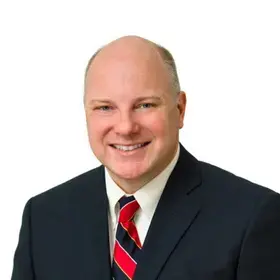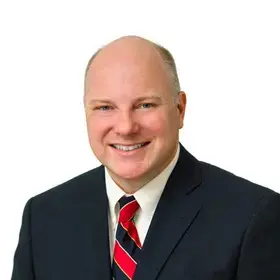Christopher McKeon
Senior Vice President, Everest Insurance
Insurance Management grad Christopher McKeon (’22SPS) is a senior vice president of Everest Insurance. In our interview, McKeon discusses the benefits of an asynchronous format, his advice to students, and expanding his professional network through the program. Edited excerpts:
Why did you choose the Master of Professional Studies in Insurance Management at the Columbia School of Professional Studies?
I wanted to refresh my knowledge and update my skills in areas that weren’t taught when I started in the industry, like insurtech innovations and data analytics. Having also taken a couple of classes at Columbia many years ago, I knew the quality of the coursework would be exceptional—and it was.
How does this program differ from an M.B.A.?
I also completed an M.B.A. program at Fordham University that offered study across a broad range of topics, which I enjoyed. What I learned in the Insurance Management M.P.S., however, has been more applicable to my career. Not only is the subject matter in every course relevant to my profession, but the projects and coursework were directly related to issues and problems I tackled in the scope of my job. The other benefit of the Insurance Management program was the expansion of my industry network, since all my classmates and lecturers were tied to the insurance industry.
What’s one piece of advice you’d give to prospective students?
As with most things in life, it is what you make of it. I tried to take advantage of everything the program itself and the wider Columbia community had to offer, which resulted in a terrific experience. As part of that, know what it is you want out of the program and share that with the lecturers and the administration. Everyone in my cohort had different reasons for pursuing the program, and the professionals at Columbia made the effort to put us all in positions where we could successfully realize our objectives.
What are the benefits of this asynchronous program from a learning and networking perspective?
While there was regular work, the asynchronous program allowed me to manage my time so I could meet both my school and work obligations. I found a routine that worked for me, but the inherent flexibility in the format allowed me to make adjustments as needed. I was even able to work ahead if I knew a challenging schedule was coming up at work. As for networking, the program exceeded my expectations. It was a pleasure to work with my fellow students and learn about their diverse backgrounds in the industry. Many of them live and work overseas or on the opposite side of the United States from where I am based. These are people I would never have met had it not been for the program. While I knew the virtual nature of the program allowed for a geographic spread of students, I didn’t realize the benefits of it until I began the program.
How were you able to build meaningful relationships in this online program? How did you engage with faculty, students, and guest speakers?
When I was considering the program, I wondered if it would feel like a traditional correspondence school, simply submitting work to faceless professors and rarely engaging with fellow students. I could not have been more pleasantly surprised by the level of collaboration and engagement I had with my cohort and our lecturers. Project teams worked virtually on a weekly basis through video calls, the faculty held video office hours, and on an individual basis I was texting or speaking on the phone with my classmates. Fortunately, many of us also got together in person if we happened to be in the same city at the time. I’m happy to say the members of my cohort started out as industry peers but are now friends, and the faculty, who have been so giving of their time, have become a group of trusted advisors.
How did your career change during and/or after earning an M.P.S.?
Since graduating, I have expanded my job responsibilities into product lines I had not had the opportunity to work in before. When preparing for this change, I sought out advice and education from several members of the faculty, and all of them were helpful and gracious with their time. Moreover, some lecturers suggested I speak with other experts in the industry and made those introductions for me. Not only did that help me get the information I needed, but I was able to expand my network even further. Another way the program has enhanced my career is by facilitating a personal goal of mine to produce original thought leadership pieces. Leveraging coursework and projects in the program, I successfully authored three articles in industry trade publications and plan to write more.

